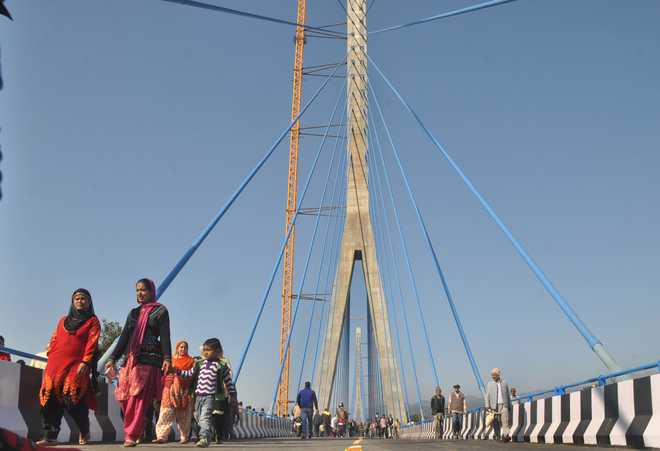Basohli (J&K), December 24
A strategically-important cable-stayed bridge marking a crucial step as it will provide close connectivity among the three states: Jammu and Kashmir, Himachal Pradesh and Punjab.
The 592-metre span bridge, called 'Atal Setu' after the former Prime Minister Atal Bihari Vajpayee, on Ravi river in Kathua on the Dunera-Basohli-Bhaderwah road was inaugurated by Defence Minister Manohar Parrikar, who was accompanied by Union Minister Jitendra Singh and Army Chief Dalbir Singh Suhag. The bridge, which has the second longest span in India, is the fourth of its kind in the country: the only other cable-stayed bridges in the country are Hooghly Bridge at Kolkata, Naini Bridge in Allahabad and Rajiv Gandhi Sea Link in Mumbai.
The bridge, built by Border Roads Organisation (BRO), is strategically important from defence point of view: it will reduce the distance of travel to Punjab and HP and also help improve connectivity and tourism between the three states.
"It was the most challenging task before the BRO engineers to accomplish this task," officials said.
"Not only the Indian engineers and consultants, the agencies from Canada, Japan, Spain and Switzerland have also been engaged for the completion of this prestigious project by the BRO authorities," they said.
The work on the maiden cable-stay bridge of the state was started in September 2011 after UPA Chairperson Sonia Gandhi laid the foundation stone in May 2011. It was built at the cost of Rs 145 crore.
The bridge was built on the demand of people of Basohli where over 22 villages were submerged in water and evacuated to other places after the construction of Ranjit Sagar dam. — PTI
Unlock Exclusive Insights with The Tribune Premium
Take your experience further with Premium access.
Thought-provoking Opinions, Expert Analysis, In-depth Insights and other Member Only Benefits
Already a Member? Sign In Now










